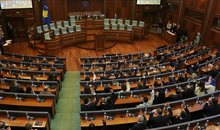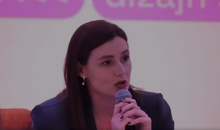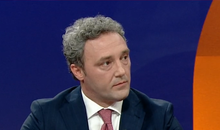
 Flash News
Flash News
Fight between teenagers, 15-year-old ends up in hospital
Kosovo Assembly constitution, proposal for secret ballot fails
Serious accident on the Peqin-Elbasan axis, two people seriously injured
'Fight, fight, fight'/ PD-ASHM towards historic victory, LaCivita mobilizes the campaign at the meeting with the candidates
Car hits pedestrian on Korça - Pogradec road, 43-year-old woman dies
Fiscal peace or electoral coup?! Businesses owe 1.6 billion euros to the state

On the eve of the elections, the government proposed to businesses “Fiscal Peace” – a package that includes massive debt forgiveness and a review of tax obligations. Albanian businesses owe the state 1.6 billion euros. For experts, this is another electoral ploy that undermines fiscal justice and encourages informality.
In a meeting with businesses from Elbasan at the height of the election campaign, Prime Minister Edi Rama unexpectedly presented a new initiative: "Fiscal Peace", a relief package that includes massive debt forgiveness and a review of tax obligations.
“A fiscal peace plan, inspired by the principles of Ancient Rome,” Rama described this move a few weeks before the elections. “We have thought of a plan (…) used time and time again in different forms, a fiscal peace plan,” he further declared.
The package is not part of the "Albania 2030" political program, but the government argues that it will bring less stress for businesses, fewer controls, and more clarity.
The three main pillars of Fiscal Peace:
Agreed Tax on Profit
Review of Financial Statements
Forgiveness of Liabilities and Interest on Late Payments
The initiative provides for the full cancellation of tax debts older than 10 years, if they are still outstanding. For liabilities from 5-10 years, a 50% cancellation of the debt is foreseen, if the business pays it immediately. While businesses that do not have the possibility of immediate repayment, there will be a 12-month agreement and the forgiveness will be at the rate of 25%. Social security liabilities are not included here.
The package also proposes the revision of previous income tax returns.
Businesses are given the right to revise their tax returns for the last 5 years without penalties or interest (current legislation allows for 3 years) but by paying a 5% profit tax for any profit difference created by the revision.
How much debt do businesses have to the state?
Albanian businesses owe the state 162.5 billion lek, or 1.6 billion euros, in unpaid taxes and customs debts.
Value Added Tax (VAT) and corporate income tax are the main taxes that businesses have not paid over the years. Official data shows that 84.7% of debt is overdue for more than 2 years. While liabilities overdue for more than 5 years account for 64.4% of the total.
84.7% of this debt is older than 2 years.
64.4% belongs to the period over 5 years.
Over the last decade, the stock of business debt has increased year after year, with the only exception being 2017.
Former tax director Artur Papajani says that debt cancellation is not a privilege, but a punishment.
"The massive cancellation of tax debts is not a privilege for debtors! It is a punishment and a discouragement for thousands of taxpayers who have always been correct in their tax compliance," Papajani argues for Faktoje.al.
Meanwhile, legal auditor Julian Saraçi describes the initiative as the state's capitulation in the face of informality.
"Fiscal peace is a repeated act of surrender to the informality that has been tolerated for years. This initiative is not an agreement, it is capitulation."
If businesses have outstanding debts for more than 10 years, this means that the administration has failed to collect this debt on time - emphasizes Saraçi.
"So, we don't just have an apology, but also an institutional expiation. Therefore, I think that more than peace, an in-depth investigation should be conducted into why this debt was created and prescribed and why measures were not taken to collect it."
The debt of businesses to the state would be even greater, but governments have occasionally approved fiscal amnesties, forgiving billions of lek in debts of entrepreneurs in the country.
Fiscal measures on the eve of elections
This is not the first case of debt forgiveness in the pre-election period. Since 2009, at least 6 amnesty measures have been taken, which coincide with local or parliamentary elections.
In 2009, as Albanians were about to head to the ballot boxes for the general parliamentary elections, the government of the time proposed the legalization of undeclared capital. In the years 2011-2014, old fines and obligations were forgiven, to be followed later in 2019 with the forgiveness of energy debts. Also, in the years 2023-2024, the government revived the draft law on fiscal amnesty despite the fact that all international institutions such as the IMF, the World Bank and the European Union were against it.
"This pattern is not a coincidence, but a repeated electoral strategy, where the state uses fiscal policy as a tool to buy tolerance instead of building fiscal discipline" - ALTAX
Experts from the ALTAX center argue that this model must be stopped urgently as the consequences will be severe.
"Informality will increase because taxpayers will tend not to pay in the hope of another 'forgiveness'. Fiscal equality will also be damaged, because the state of the 'forgiven' can never be just, and clientelism will be strengthened because fiscal forgiveness is always happening at the ballot box" - ALTAX
Is this peace, or simply a pre-election stunt that promotes injustice and harms honest entrepreneurs? This is the question that arises today, as the law is softened during the campaign. Faktoje.al
Latest news



For those who were scared by Tomorr Alizoti
2025-05-01 21:05:21
Berisha challenges Rama: You promised free healthcare, come here and keep it!
2025-05-01 20:56:58



The six best foods against stomach bloating
2025-05-01 20:04:09


Zelensky: We want peace, Russia responds with attacks
2025-05-01 19:22:07

Berisha: The contract in the US is not just for the DP, but for every Albanian!
2025-05-01 19:08:14
Fight between teenagers, 15-year-old ends up in hospital
2025-05-01 18:44:17






Demi Moore named the most beautiful woman in the world for 2025
2025-05-01 17:34:10
Waltz to step down as Trump's national security adviser
2025-05-01 17:24:25

What has Albania exported the most?
2025-05-01 16:49:18
Accident at 9-story building in Tirana, two injured
2025-05-01 16:47:16
How is lifestyle affecting health? Expert: Addictions are causing malnutrition
2025-05-01 16:32:09
Kosovo Assembly constitution, proposal for secret ballot fails
2025-05-01 16:22:35

Britain in talks with France and Saudi Arabia on recognizing Palestinian state
2025-05-01 15:57:30

Russian drones strike major cities in Ukraine
2025-05-01 15:39:45
Farmers in difficulty, Egyptian potatoes outstrip Steblevë's
2025-05-01 15:31:36
Serious accident on the Peqin-Elbasan axis, two people seriously injured
2025-05-01 15:15:25
Inaugurated a few months ago, Zhupa: Handball stadium, dangerous for children
2025-05-01 15:10:19
Eurostat: Albanians are paid less, but have the longest working hours in Europe
2025-05-01 14:57:32
The most effective vitamins for strengthening the immune system
2025-05-01 14:53:06

May 1/ Workers in Kosovo protest for their rights, demand wage increases
2025-05-01 14:33:55

Roven Zeka met in the cell, SPAK investigates 4 police officers, phones seized
2025-05-01 14:17:09




Xhaferri: Pro-Rama polls are manipulated by incinerator payments
2025-05-01 13:23:16
51-year-old woman disappears in Kukës, search begins
2025-05-01 13:02:20

Fallen in England, 32-year-old woman dies after falling from parachute
2025-05-01 12:44:54





Staged explosion in Elbasan, head of family wanted asylum in the EU
2025-05-01 11:17:10
Muzhaqi: ChatGPT prepared a very beautiful speech for me
2025-05-01 11:11:29
Berat Prosecution seeks 6 years in prison for pedophile who molested a minor
2025-05-01 10:53:00

TNT explosion in Elbasan, police react: Cameras have filmed the perpetrator
2025-05-01 10:28:31
7x7 doesn't make 6 million for us, but 33 thousand euros!
2025-05-01 10:23:13

TNT explosion in an apartment in Elbasan
2025-05-01 10:03:01
Accident on the "Memaliaj-Krahës" axis, 71-year-old man loses his life
2025-05-01 09:44:45


Vehicle bombed in Tirana, explosives placed in front tire
2025-05-01 09:10:30

Car hits pedestrian on Korça - Pogradec road, 43-year-old woman dies
2025-05-01 08:39:39
Sunshine and temperatures up to 30 degrees Celsius, weather forecast
2025-05-01 08:21:48
Today is Workers' Day, what does May 1st represent?
2025-05-01 08:05:44
Posta e mëngjesit/ Me 2 rreshta: Çfarë pati rëndësi dje në Shqipëri
2025-05-01 07:55:45
Journalist: Rama used the money to lobby for himself, not for Albania
2025-04-30 22:54:10
Kurti's invitation to constitute the Assembly, PDK responds, LDK refuses
2025-04-30 22:36:18











Fiscal peace or electoral coup?! Businesses owe 1.6 billion euros to the state
2025-04-30 18:59:05


Finland passes law banning cell phones in schools
2025-04-30 18:00:25

Italian court overturns Hysaj's conviction, Albanian defender fined 40,000 euros
2025-04-30 17:32:13


Minerals deal with US could be signed within next 24 hours, Ukraine confirms
2025-04-30 16:53:19

Stress at the office can be more dangerous than smoking!
2025-04-30 16:18:54
BKH leader Aida Hajnaj seeks a second 5-year mandate
2025-04-30 16:18:43


By 2023, over 350,000 people had left Kosovo.
2025-04-30 15:23:56

